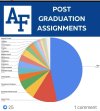With his interests, suggest he also explore intel careers in the federal “ABC” agencies and departments which are hungry for career intelligence analysts. It’s a big community. They have college programs and internships. I am not talking about “door-kicker” agents here, but the community of functional experts and analysts in intel, cyber, logistics, operations planning, forensics, etc., who work in concert with operational types.
For example:
The National Security Agency offer internships, scholarships, a co-op program and more.

www.intelligencecareers.gov
The internship and co-op programs at CIA offer highly unique and rewarding student experiences as you help keep our Nation safe. Work alongside experts in your field as you gain real-world experience within the intelligence community.

www.cia.gov
Protect the American people and uphold the Constitution by joining the FBI as a special agent, intelligence analyst, or professional in over 200 career trajectories.

fbijobs.gov
Student Hiring Programs: Acquisition and Procurement, Cybersecurity, Pathways, Health and Science, I&A Internship, Law Enforcement, Legal, Public Affairs.

www.dhs.gov
We offer a wide variety of programs to jumpstart your career.

www.intelligencecareers.gov
That’s just a sample of what’s out there for those who know they want intel from the get-go. In the military, that’s a relatively small officer community and not the primary purpose of the SAs and ROTC programs.
Your son should also research the SA websites, read every page, link and hamburger/drop-down menu item to understand their mission and the officer specialty communities available. The SAs produce leaders and warriors first. Visiting the SAs and attending their summer programs is also a great way to explore whether the military path is a fit for him.
The sister of one of the mids we sponsored at USNA did the NSA program while a math major at Purdue. She was immediately hired by them after graduation, has rapidly progressed, and had her applied mathematics M.S. at a prestigious university paid for. She can’t talk about what she does, but she thoroughly enjoys her work. She knew the “warrior path” taken by her sister was not for her, and she also had a med issue that DQ’ed her from military service, which was not an issue for federal service.
And, there are plenty of introverts in the military. As long as you know how to get up and talk to and lead your people, engage with them, you’re fine.


